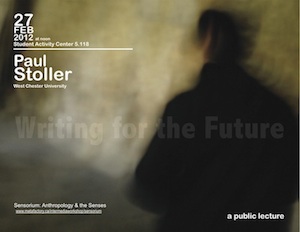Writing for the Future
A public lecture by Professor Paul Stoller (West Chester University)
Time: February 27, 2012 at Noon
Location: Student Activity Center 5.118
Paul Stoller’s Faculty web page
Abstract: In the academy there has always been a tension between institutional expectation – what we are expected to do to advance on our scholarly path – and creative desire – what we want to produce to fulfill our deep existential obligations. Given the power of academic institutions, most of us, and here I certainly include myself, tend to do what is expected: to produce academic texts that are markers of intellectual distinction. These texts, usually written with the “dead hand of competence” in a bloodless plain style, may well raise eyebrows and make important contributions to knowledge. They are usually documents that seek “the truth of statements,” a truth formed in the logical precision of discourse. No matter the sophistication of the argument, these texts usually do not endure. In relatively short periods of time, they are stored away – to make room for newer works that reflect the next moment. Once in storage, these “dated” texts remain closed to the world. But there is another path. Texts that seek the “truth of being,” a truth that is, in part, sensuously evoked through narrative and image, have a much better chance of remaining open to the world. These are productions in which the scholar takes institutional risks to create works that may pass the test of time, works that produce knowledge that somehow makes life a little sweeter. In this talk, I suggest how anthropologists might produce works that seek a “truth of being.” These are productions that reflect a measure of mastery. For the Songhay of Niger, mastery is reached when the specialist – a custodian of knowledge – is finally ready to take on the greatest obligation: to pass on what he or she has learned on to the next generation. Stories are told, lessons are learned and the work moves on to a future in which the specialist’s thoughts and images remain open to the world.
“Paul Stoller has been conducting anthropological research for 30 years. His early work concerned the religion of the Songhay people who live in the Republics of Niger and Mali in West Africa. In that work, he focused primarily on magic, sorcery and spirit possession practices. Since 1992, Stoller has pursued studies of West African immigrants in New York City. Those studies have concerned such topics as the cultural dynamics of informal market economies and the politics of immigration. The results of this ongoing research has led Stoller to the study of the anthropology of religion, visual anthropology, the anthropology of senses and economic anthropology. Stoller’s work has resulted in the publication of 11 books, including ethnographies, biographies, memoirs as well as two novels. His work is widely read and recognized. In 1994 he was awarded a prestigious Guggenheim Fellowship. In 2002, the American Anthropological Association named him the recipient of the Robert B Textor Award for Excellence in Anthropology. He lectures frequently both in the United States and Europe and has appeared on various NPR programs as well as on the National Geographic Television Network.” (Huffington Post)

